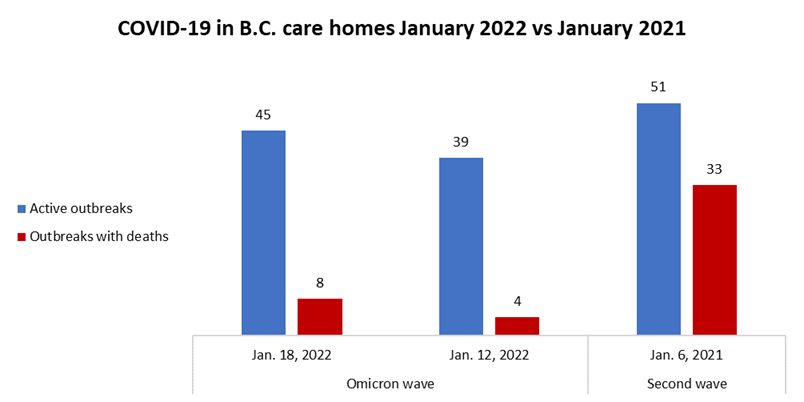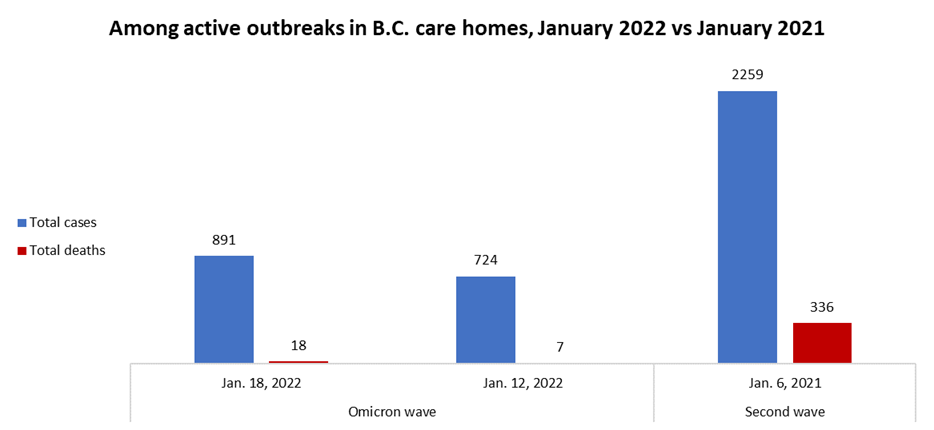Deaths associated with COVID-19 outbreaks in B.C. rising, but still far fewer than previous waves
The number of COVID-19 cases and outbreaks in B.C. care homes continues to grow during the Omicron surge, but deaths in this wave remain less common than they were during previous ones.
In the latest report on outbreaks in long-term care, assisted-living and independent-living homes from the B.C. Centre for Disease Control - which captures data as of Tuesday morning - there were 45 active outbreaks in the province.
Of those outbreaks, eight had any deaths associated with them (18 per cent of the total).
That's an increase from the previous week's report, when there were 39 active outbreaks and only four of them had resulted in deaths (10 per cent of the total number of outbreaks).
However, this week's numbers are still a far cry from what they were in January 2021, when the BCCDC reported 51 active outbreaks and 33 with deaths associated (65 per cent).
A similar pattern holds when looking at the percentage of care home cases ending in death. This week's 45 outbreaks have a total of 891 cases associated with them, and the eight that have seen at least one resident die have seen a total of 18 deaths between them.
This means that, so far, 2 per cent of infections associated with active care home outbreaks in B.C. have resulted in death.
That's an increase from last week, when a total of seven deaths were associated with 724 cases, good for a death rate of just 1 per cent.
It's still much improved from January 2021, however, when there were 2,259 infections associated with active outbreaks, and 336 people had died, a death rate of nearly 15 per cent.
 The number of active care home outbreaks in which residents have died for three specific dates, two from the Omicron wave and one from the second wave in January 2021. (Data from the BCCDC)
The number of active care home outbreaks in which residents have died for three specific dates, two from the Omicron wave and one from the second wave in January 2021. (Data from the BCCDC) Total cases and deaths associated with active outbreaks in B.C. care homes for three specific dates, two during the Omicron wave and one during the second wave in January 2021. (Data from the BCCDC)
Total cases and deaths associated with active outbreaks in B.C. care homes for three specific dates, two during the Omicron wave and one during the second wave in January 2021. (Data from the BCCDC)
Obviously, a lot has changed over the last year. In early 2021, the province was still in the process of administering first and second doses of COVID-19 vaccines in care homes. The Alpha variant of concern was just starting to appear in B.C. and had not yet become the dominant strain of the coronavirus in the province.
Today, the vast majority of care home residents have received booster doses of vaccine, and the extremely contagious Omicron variant is generally causing milder illness in those who have been immunized.
Speaking to reporters during a news conference Friday morning, provincial health officer Dr. Bonnie Henry credited high uptake of booster shots among residents and staff in long-term care with "changing the balance" of precautions that are needed in long-term care homes.
"With the increase in transmission in our communities, we've also seen increases in cases and outbreaks in long-term care and assisted living among both residents and staff," Henry said. "For family members, for people who work and operate in long-term care and for our public health team, I know this is very concerning."
"Our focus continues to be to protect our elders and seniors who we know - and we've seen the data - are more vulnerable to severe illness, but also to balance that with ensuring our seniors have the care and the support they need," she added.
Henry did not specify what changes would be made to long-term care restrictions as the province begins to manage COVID-19 more like it manages the common cold.
Unlike colds and flus, the coronavirus remains dangerous enough to warrant the public health measures B.C. currently has in place, the provincial health officer said.
Last month, Henry introduced a public health order restricting visits at long-term care homes to essential visitors only. That rule does not apply to assisted-living facilities.
CTVNews.ca Top Stories

'He's in our hearts': Family and friends still seek answers one year after Nathan Wise’s disappearance
It’s been a year since Nathan Wise went missing and his family is no closer to finding out what happened to him.
'My family doctor just fired me': Ontario patients frustrated with de-rostering
Dozens of Ontarians are expressing frustration in the province’s health-care system after their family doctors either dropped them as patients or threatened to after they sought urgent care elsewhere.
Ottawa pizzeria places among top 20 deep-dish pizzas in the world at international competition
An Ottawa pizzeria is being recognized as one of the top 20 deep-dish pizzas in the world.
Canada Post cracks down on Nunavut loophole to get free Amazon Prime shipping
Amazon's paid subscription service provides free delivery for online shopping across Canada except for remote locations, the company said in an email. While customers in Iqaluit qualify for the offer, all other communities in Nunavut are excluded.
Edibles, armchairs and adapters: Here are the recalls for this week
Health Canada announced various product recalls this week, including electric adapters, armchairs, cannabis edibles and vehicle components.
Putin replaces Russian defence minister in rare cabinet shakeup
Russia’s President Vladimir Putin began a Cabinet shakeup on Sunday, proposing the replacement of Sergei Shoigu as defence minister as he begins his fifth term in office.
Suspect sought after fatal slashing in downtown Toronto
Police are searching for a suspect in a homicide investigation after a man was slashed in downtown Toronto on Sunday.
Wildfire near Fort McMurray more than triples overnight, several evacuation alerts remain in place
The fire burning near Fort McMurray grew from 25 hectares to 5,500 hectares over the weekend.
WATCH Dashcam video shows terrifying near-miss on two-lane northern Ontario highway
There were some scary moments for several people on a northern Ontario highway caught on video Thursday after a chain reaction following a truck fire.































